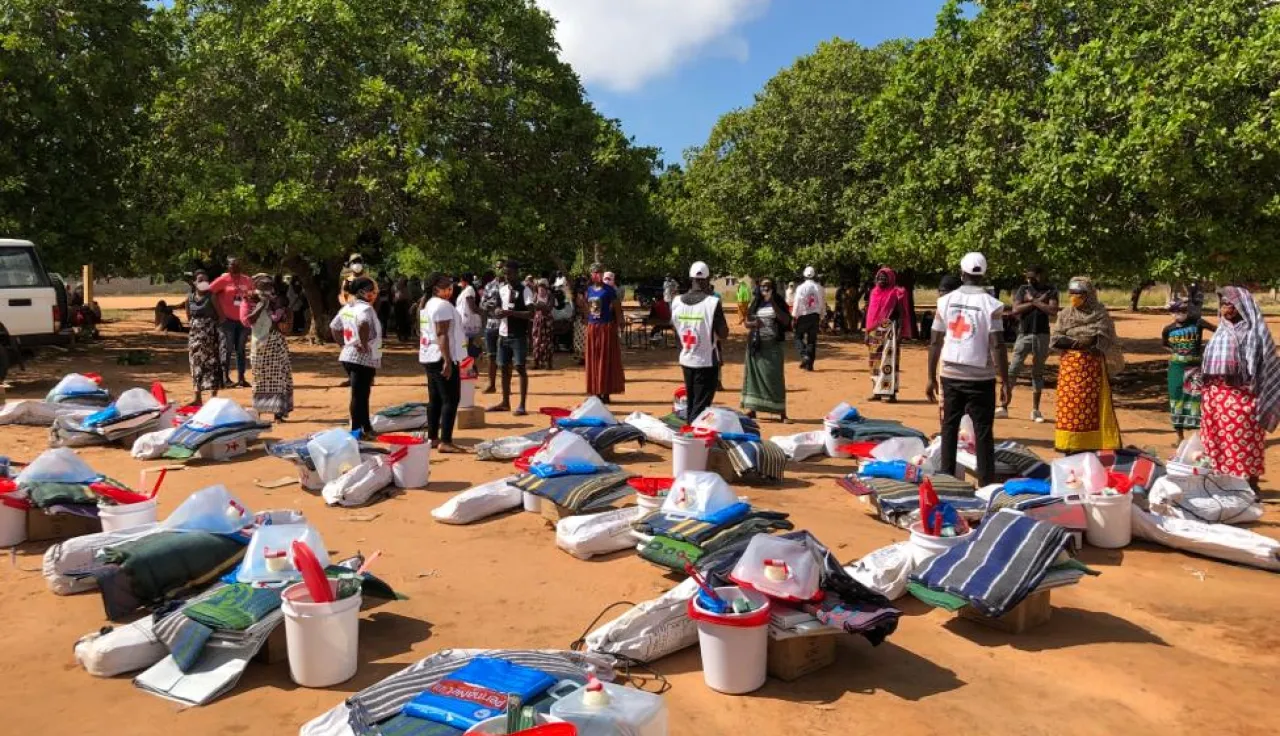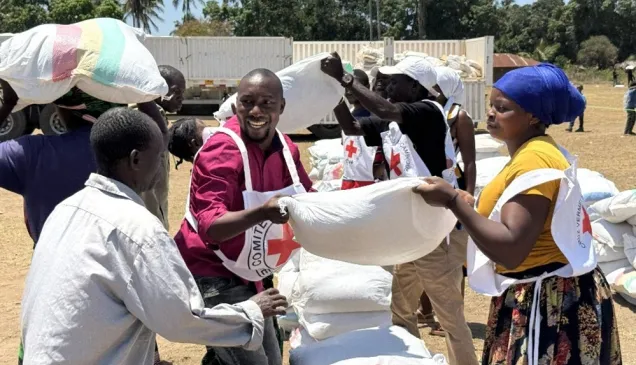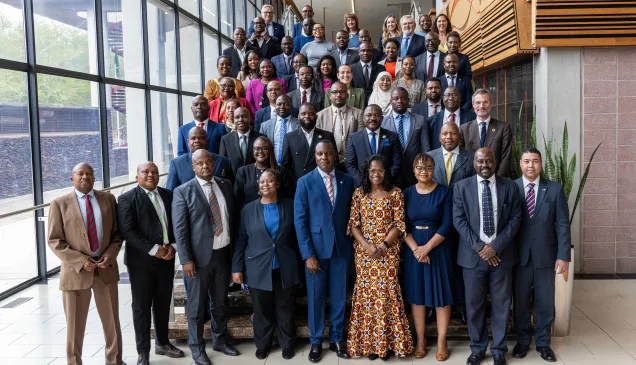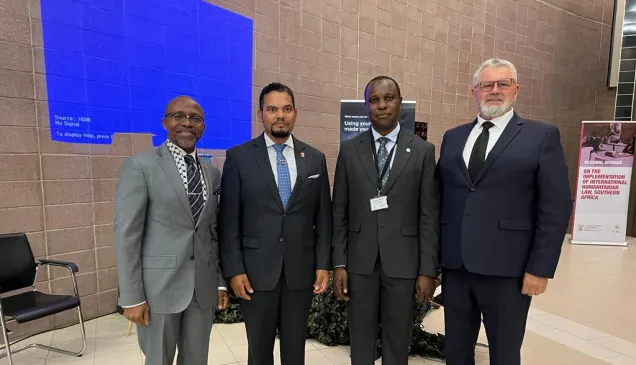Maputo (ICRC)—Attacks on towns and villages in Mozambique's northern province of Cabo Delgado have intensified, forcing thousands of people to flee by foot, boat or road to the provincial capital, a COVID-19 hotspot where the International Committee of the Red Cross (ICRC) helped build the country's largest treatment centre that opened on 2 September 2020.
Families have arrived in Pemba exhausted and traumatized after leaving their homes with few or no possessions, with more expected to possibly arrive in the coming weeks who fled recent attacks in Mocímboa da Praia and other parts of the province.
"People fleeing armed conflict in Mozambique are trading this life-threatening danger for the risk of COVID-19. The new treatment centre will help the community respond to the health crisis, but these families cannot return until the fighting moves away from civilian homes," said Raoul Bittel, the head of the ICRC's operations in Pemba, Mozambique.
The risk of contracting COVID-19 in Pemba, one of Mozambique's most concerning virus epicentres, is very real. Most of the displaced find shelter with families or relatives, putting an additional burden on them and increasing the kinds of overcrowded conditions that help propagate the spread of COVID-19, as physical distancing becomes impossible.
"The Décimo Congresso is the largest facility for the treatment of COVID-19 cases in the country," said Dr. Basilio dos Mwelus, the head of planning department, Provincial Health Direction. "We hope we will not have to make full use of the infrastructure but in case this becomes necessary all conditions are set to respond. This is particularly important in the province of Cabo Delgado with a high number of displaced people and greater concentration of population particularly exposed to the risk of contamination."
The recent attacks in Mocímboa da Praia are the latest example of a troubling trend in which the armed conflict is escalating as humanitarian access is shrinking. In Mocímboa da Praia, Macomia, and towns and villages across Cabo Delgado, the conflict has shown no regard for civilian life or property. Homes have been burned to the ground, schools and health care facilities looted and destroyed, and farmland ruined. Hundreds of people have been killed, wounded or gone missing and hundreds of thousands are forcibly displaced from their homes, hiding in the bush or fleeing.
Recurrent violence has plagued communities in resource-rich Cabo Delgado since 2017, but it has escalated in frequency and intensity in 2020. Towns that were previously unscathed and served as places of refuge for those who fled attacks in more rural areas have come under fire.
In late May, Macomia town, where the ICRC had been working for a year to restore water and health care services, was attacked, forcing the entire town to run into the bush and flee on precarious boats heading south. In the clashes, a maternity hospital that the ICRC repaired after it was damaged in Cyclone Kenneth in 2019 was destroyed.
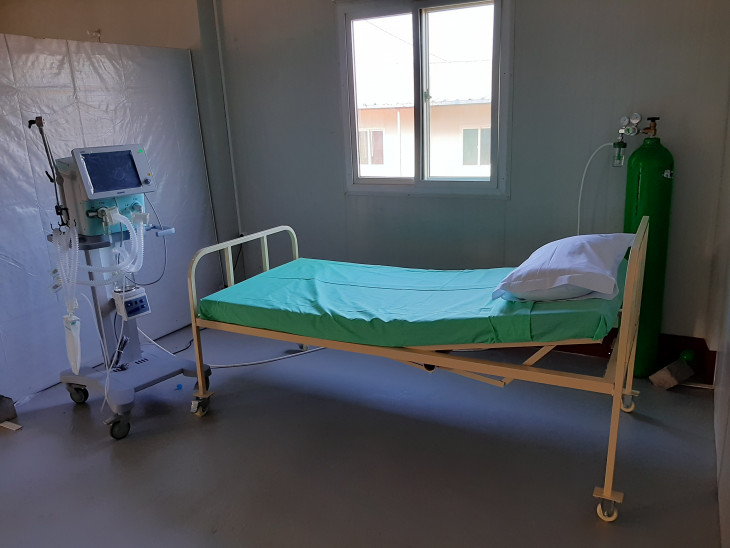
The ICRC helped to build a 200-bed COVID-19 treatment centre—the country's largest—in Pemba, the capital of Cabo Delgado province where attacks on towns and villages have intensified, uprooting thousands from their homes.
More on the ICRC's work and humanitarian concerns in Cabo Delgado:
- The recent attacks in Mocímboa da Praia are the latest example of a troubling trend in which the armed conflict is escalating as humanitarian access is shrinking. We are extremely concerned about the well-being of families who are living with the fear of being attacked and without access to the basic humanitarian support, such as health care, shelter, food, and clean water, that the law affords them.
- The attack on Macomia town forced the ICRC to suspend its work there indefinitely. This comes after months of access issues after flooding wiped out roads and bridges into the area, and as our work to improve water supply to the town was unfinished. A maternity hospital that we had repaired after Cyclone Kenneth and reopened in December 2019 was destroyed in the clashes.
- The ICRC, together with the Mozambique Red Cross (CVM), will be scaling up programmes in Cabo Delgado in 2020 to meet the growing humanitarian needs created by the armed conflict. Health care facilities, now facing pressure to care for a larger population and deal with injuries from armed attacks, will receive medical equipment and supplies while infrastructure such as water supply will be rehabilitated as needed. The CVM volunteers will also raise awareness in communities about communicable diseases. The ICRC and the CVM also plan to provide relief items such as sleeping mats, mosquito nets, tarpaulins, and soap as well as clean water and sanitation facilities for displaced families in the coming year.
- To help Pemba deal with rising COVID-19 cases, the ICRC helped in the construction of Décimo Congresso, the largest COVID-19 treatment centre in the country, together with the World Health Organisation and UNICEF. The facility can immediately accommodate 200 patients and can expand to 400.
- The ICRC and the CVM have organized multiple distributions of relief items for displaced families who fled to Pemba. This year, we have provided kitchen sets, tarpaulins, personal hygiene items, and other essentials to over 12,500 people, while also following physical distancing rules to curb the spread of COVID-19. We also provided cash assistance to 150 highly vulnerable families to help with expenses.
For more information, contact:
Daphné Lucas, Southern Africa spokesperson, +49 176 776 56857, dlucas@icrc.org
Crystal Wells, East Africa spokesperson, +254 716 897 265, cwells@icrc.org

